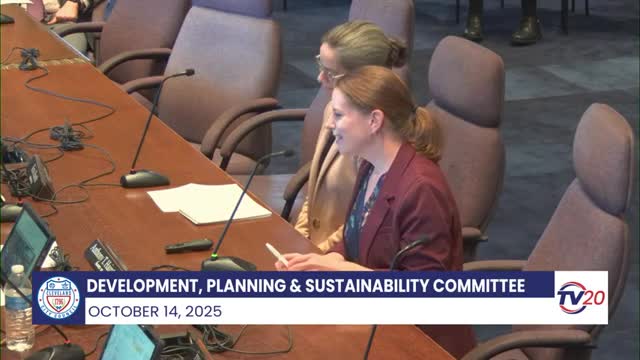Committee approves CMAQ-funded bikeways and refuse-truck electrification plan; ordinance amended to fix spending cap and attach executive summary
Get AI-powered insights, summaries, and transcripts
Subscribe
Summary
A Cleveland City Council committee approved Ordinance 1218-2025 to implement a CMAQ grant for high-comfort bikeways, sidewalk improvements and a pilot to electrify refuse vehicles, and amended the ordinance to set a not-to-exceed amount and attach the executive summary.
A Cleveland City Council committee approved Ordinance 1218-2025 authorizing implementation of a CMAQ (congestion mitigation and air quality) grant to fund approximately 15 miles of high-comfort separated bikeways, targeted sidewalk work and a pilot electrification of refuse vehicles. The committee adopted three amendments: (1) require clerk notification on certain expenditures, (2) set a not-to-exceed amount of $6,815,532, and (3) attach the executive summary as a file attachment.
City planning director Cali Mersman and Director Sarah O’Keefe (Sustainability and Climate Justice) described the two grant components: (a) a pilot to electrify refuse trucks in coordination with Motor Vehicle Maintenance and Public Works, and (b) construction of separated bikeways and sidewalk segments aligned with the Cleveland Moves multimodal plan. Mersman said the funding is federal money that flows through the state and NOACA and is awarded on an 80/20 split (80% federal, 20% local match). Mersman explained the city had applied earlier in the year for a larger amount; the current ordinance reflects a partial award recommended by the state board.
Project specifics and funding Mersman said the award amount reflected in committee materials was $5,450,000 in federal funds with a $1,360,000 local match (the executive summary attached at committee lists a not-to-exceed $6,815,532). Construction funds become available in state fiscal year 2030 (state fiscal year begins in 2029), though the city may seek earlier access to funds if design and procurement are ready. The transportation component targets roughly 15 miles of separated bikeways on key connectors, plus sidewalk work near priority schools and a trail gap connection between Treadway Creek (Jennings Road) and the Towpath Trail at Harvard and Jennings.
Vehicle electrification Director Sarah O’Keefe described the grant’s vehicle component as funding to offset the higher cost of electric refuse trucks compared with diesel; the grant would cover the differential and help reduce local air pollution. Chief-level staff and Motor Vehicle Maintenance were identified as implementation partners.
Amendments and committee concerns Councilman Harsh proposed the three amendments (notification to clerk on expenditures, a specific not-to-exceed dollar amount of $6,815,532, and attaching the executive summary); the committee approved the amendments and the ordinance as amended. Several council members asked staff to consult directly with councilmembers whose wards include segments in the 15-mile package before the ordinance proceeds to additional committee/finance steps; staff agreed to perform outreach as designs and procurement move forward.
Ending The committee approved the ordinance as amended. Staff said design, right-of-way work and community engagement will precede construction and that the city will not expend funds until federal awards and required local matches are in place.
